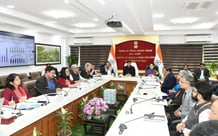The practice of healing in Africa has evolved a long way from the times when mankind associated every disease with an evil spirit or demon to the stage where it now embraces the use of evidence-based modern effective medicines and alternative natural remedies. The role of Pharmacists in this gradual development can not be disputed. Pharmacists have diverse roles critical to the integrity of the health system such as dispensing and accurately recording prescriptions in hospital pharmacies to providing advice on the use and misuse of drugs in community pharmacies to drug development and production in the industry. Despite the critical roles of Pharmacists, the number of pharmacists on the continent is insufficient in number to cater to the expanding population leaving many the need for basic healthcare needs.
In the process of solving problems, recent developments have spurred the innovation of novel technologies and practices that improve the practice of Pharmacy to the next level and accelerate the progress to achieving “Health for All”. The practice of Pharmacy is faced with a future with so many possibilities for achieving a better healthcare system and integrated practice.
Certain challenges threaten the actualization of such reality such as the poor uniformity of pharmacy practices and poor awareness of National or regional pharmacovigilance systems. Only a few people are aware of the existence of Pharmacovigilance systems hence ADR(Adverse Disease Reactions) reporting is not very common.
The lack of interdisciplinary networks amongst Pharmacists and other healthcare workers poses a problem for achieving a better patient outcome. There is a need to enhance interprofessional collaboration between local pharmacies and hospitals for better communication and healthcare delivery. Poor healthcare investment is a problem that can not be undermined. Many individuals incur out-of-pocket expenditure to cater to their health needs leaving many in poverty.
Basic healthcare is a right for everyone but in a nation with little investment of resources into healthcare, such right is not enjoyed by everyone. The lack of automated public health systems, as exposed by the recent COVID-19 pandemic, makes community surveillance difficult. Most health centers and Pharmacies do not utilize full computerization of records and data, making data sharing very difficult. With the advent of Pharmacogenomics and other novel systems, inadequate knowledge by health professionals and persisting on old policies and education is not healthy in improving the pharmacy practice in Africa.
Regardless of the challenges, the future of Pharmacy practice in Africa still looks promising, especially with a technology like Artificial intelligence. The capacity for artificial intelligence to revolutionalize healthcare can not be underestimated. Artificial intelligence, as we know it, could minimize common errors and increase the ability of pharmacists to even access remote areas and provide evidence-based decisions.
Artificial intelligence could be instrumental in achieving universal health coverage. Another innovation is Pharmacogenomics. Pharmacogenomics is the use of genetic information to provide personalized medicine to the patient, thus minimizing the number of adverse reactions and improving patient care. In its infancy still, Pharmacogenomics provides a great opportunity for changing the scale of practice in the future.
Digital Pharmacy and novel drug delivery systems are newer practices capable of reshaping the future of the practice beyond traditional approaches. Novel drug delivery systems can be used to target drugs directly to affected organs or tissues, therefore reducing the incidence of systemic side effects. With the advent of newer practices and technology, pharmacy practice is really undergoing a dynamic change.
Change is constant and inevitable, and in some developed countries, it is already here, but in some other countries, it might take a while. Africa is challenged with some setbacks regarding the pace of healthcare development yet those temporary setbacks do not inhibit the possibility of a better future.
This article is a call to policymakers, pharmacists, pharmacy students and all stakeholders involved to embrace the possibility of a better future in Pharmacy practice, and by so doing, make conscious efforts by increasing investments, incorporating digital education and novel practices into the Pharmacy curriculum, strengthening automated health systems, funding researches and providing a structural framework that enables interdisciplinary communication and interprofessional connection and enhances the implementation of digital pharmacy.














